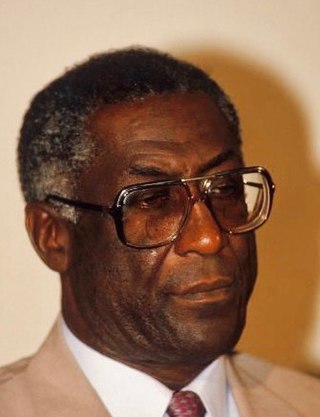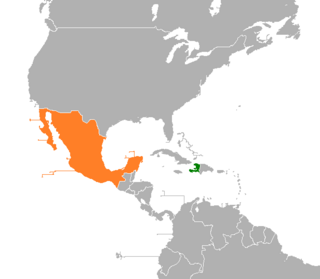Related Research Articles

Haiti,officially the Republic of Haiti,and formerly known as Hayti,is a country on the island of Hispaniola in the Greater Antilles archipelago of the Caribbean Sea,east of Cuba and Jamaica,and south of The Bahamas and the Turks and Caicos Islands. It occupies the western three-eighths of the island which it shares with the Dominican Republic. To its south-west lies the small Navassa Island,which is claimed by Haiti but is disputed as a United States territory under federal administration. Haiti is 27,750 km2 (10,714 sq mi) in size,the third largest country in the Caribbean by area,and has an estimated population of 11.4 million,making it the most populous country in the Caribbean and the 5th most populous country in North America. The capital is Port-au-Prince.
The recorded history of Haiti began in 1492,when the European captain and explorer Christopher Columbus landed on a large island in the region of the western Atlantic Ocean that later came to be known as the Caribbean. The western portion of the island of Hispaniola,where Haiti is situated,was inhabited by the Taíno and Arawakan people,who called their island Ayiti. The island was promptly claimed for the Spanish Crown,where it was named La Isla Española,later Latinized to Hispaniola. By the early 17th century,the French had built a settlement on the west of Hispaniola and called it Saint-Domingue. Prior to the Seven Years' War (1756–1763),the economy of Saint-Domingue gradually expanded,with sugar and,later,coffee becoming important export crops. After the war which had disrupted maritime commerce,the colony underwent rapid expansion. In 1767,it exported indigo,cotton and 72 million pounds of raw sugar. By the end of the century,the colony encompassed a third of the entire Atlantic slave trade.

Jean-Bertrand Aristide is a Haitian former Salesian priest and politician who became Haiti's first democratically elected president. A proponent of liberation theology,Aristide was appointed to a parish in Port-au-Prince in 1982 after completing his studies to become a priest. He became a focal point for the pro-democracy movement first under Jean-Claude "Baby Doc" Duvalier and then under the military transition regime which followed. He won the 1990–91 Haitian general election,with 67% of the vote. As a priest,he taught liberation theology and,as a president,he attempted to normalize Afro-Creole culture,including Vodou religion,in Haiti.

A coup d'état in Haiti on 29 February 2004,following several weeks of conflict,resulted in the removal of President Jean-Bertrand Aristide from office. On 5 February,a rebel group,called the National Revolutionary Front for the Liberation and Reconstruction of Haiti,took control of Haiti's fourth-largest city, Gonaïves. By 22 February,the rebels had captured Haiti's second-largest city, Cap-Haïtien and were besieging the capital, Port-au-Prince by the end of February. On the morning of 29 February,Aristide resigned under controversial circumstances and was flown from Haiti by U.S. military/security personnel. He went into exile,being flown directly to the Central African Republic,before eventually settling in South Africa.
Émile Jonassaint was a Haitian Supreme Court Justice and politician who served as President of the Constituent Assembly during the 1987 Constitution and President of Haiti for five months.

Marc Louis Bazin was a World Bank official,former United Nations functionary and Haitian Minister of Finance and Economy under the dictatorship of Jean-Claude Duvalier. He was prime minister of Haiti appointed on June 4,1992,by the military government that had seized power on September 30,1991.
Jean-Claude Bajeux was a Haitian political activist and professor of Caribbean literature. For many years he was director of the Ecumenical Center for Human Rights based in Haiti's capital,Port-au-Prince,and a leader of the National Congress of Democratic Movements,a moderate socialist political party also known as KONAKOM. He was Minister of Culture during Jean-Bertrand Aristide's first term as President of Haiti.

Claudette Werleigh is a Haitian politician who served as the prime minister of Haiti from 1995 to 1996. She was Haiti's first female Prime Minister.

CitéSoleil is an extremely impoverished and densely populated commune located in the Port-au-Prince metropolitan area in Haiti. CitéSoleil originally developed as a shanty town and grew to an estimated 200,000 to 400,000 residents,the majority of whom live in extreme poverty. The area is generally regarded as one of the poorest and most dangerous areas of the Western Hemisphere and it is one of the biggest slums in the Northern Hemisphere. The area has virtually no sewers and has a poorly maintained open canal system that serves as its sewage system,few formal businesses but many local commercial activities and enterprises,sporadic but largely unpaid for electricity,a few hospitals,and two government schools,Lycee Nationale de CitéSoleil,and Ecole Nationale de CitéSoleil. For several years until 2007,the area was ruled by a number of gangs,each controlling their own sectors. But government control was reestablished after a series of operations in early 2007 by the United Nations Stabilization Mission in Haiti (MINUSTAH) with the participation of the local population.

Michel Joseph Martelly is a Haitian musician and politician who was the President of Haiti from May 2011 until February 2016.

The Senate is the upper house of Haiti's bicameral legislature,the Haitian Parliament. The lower house of the Haitian Parliament is the Chamber of Deputies. The Senate consists of thirty seats,with three members from each of the ten administrative departments. Prior to the creation of the department of Nippes in 2003,there were twenty-seven seats. Senators are elected by popular vote to six-year terms,with one-third elected every two years. There are no term limits for senators;they may be re-elected indefinitely.
Richard Auguste Morse is a Puerto-Rican-born Haitian-American musician and hotel manager currently residing in Port-au-Prince,Haiti. Morse manages the Hotel Oloffson,and is the founder of a mizik rasin band,RAM,named after his initials. Morse is married to the band's lead female vocalist,Lunise Morse,and has two children. Morse and his band are famous in Haiti for their political songs and performances critical of the Raoul Cédras military junta from 1991 to 1994. In the early 2000s,Morse has also criticized Jean-Bertrand Aristide and Fanmi Lavalas through his music. Morse is a United States citizen. His cousin Michel Martelly is a musician,right-wing Haitian politician and former President of Haiti. Richard Morse repeatedly expressed support for Martelly in the 2010 presidential elections in Haiti. By the end of 2012,he had distanced himself from the Martelly government.

Haiti–United States relations are bilateral relations between Haiti and the United States. Succeeding U.S. presidents refused to recognize Haiti until Abraham Lincoln. The U.S. tried to establish a military base in Haiti and invaded. It withdrew in 1934 but continued to intervene in Haiti during subsequent decades.
Tourism in Haiti is an industry that generated just under a million arrivals in 2012,and is typically one of the main sources of revenue for the nation. With its favorable climate,second-longest coastline of beaches,and most mountainous ranges in the Caribbean,waterfalls,caves,colonial architecture and distinct cultural history,Haiti has had its history as an attractive destination for tourists. However,unstable governments have long contested its history and the country's economic development throughout the 20th century.
Sony Esteus was a Haitian radio journalist. For seventeen years,he served as executive director of Sosyete Animasyon Kominikayon Sosyal,an organization supporting Haitian community-based radio. At its height,SAKS supported around 30 community radio stations around the country,though many of these faced difficulties and suspended broadcasts following the 2010 earthquake. Esteus also serves as the Caribbean representative of the World Association of Community Radio Broadcasters.
The following is a timeline of the history of the city of Port-au-Prince,Haiti.

Corruption in Haiti occurs at one of the worst rates in the world. Corruption is a scourge that corrodes all attempts to establish a rule of law,a sustainable democracy,and to improve the quality of life of Haiti's people.

Haiti–Mexico relations are the diplomatic relations between Haiti and Mexico. Both nations are members of Association of Caribbean States,Community of Latin American and Caribbean States,Organization of American States and the United Nations.
References
- Notes
- ↑ Pezzullo 2011
- ↑ "New Top Minister Vows He Will End Haiti's 'Madness'". Sun Sentinel . 31 August 1993. Archived from the original on 2 February 2014. Retrieved 23 June 2023.
- ↑ Freed, Kenneth (28 August 1993). "Haitians Have 3 Different Views of Next Premier : Caribbean: The descriptions of Malval range from modest and patriotic to vacillating to naive and inexperienced". Los Angeles Times . Archived from the original on 5 March 2021. Retrieved 23 June 2023.
- ↑ Freed, Kenneth (1 September 1993). "Military Poses Obstacle to Haiti Stability Caribbean: Malval faces daunting task on reforms. U.N., U.S. aides arrive to lend support". Los Angeles Times . Archived from the original on 28 June 2011. Retrieved 23 June 2023.
- ↑ "Haitian Premier Rebels, And Promptly Loses Post". The Washington Post . 17 May 1994. Archived from the original on 28 June 2011. Retrieved 23 June 2023.
- ↑ French, Howard (20 December 1993). "PREMIER OF HAITI CRITICIZES ARISTIDE". The New York Times . Archived from the original on 3 July 2019. Retrieved 23 June 2023.
- Bibliography
- Kretchik, Walter E. (1998). "Appendix A: Historical Chronology of Haiti". US Army General Staff College. Archived from the original on 16 November 2010. Retrieved 22 April 2011.
- Pezzullo, Ralph (2011). Plunging into Haiti: Clinton, Aristide, and the defeat of diplomacy. University Press of Mississippi.
